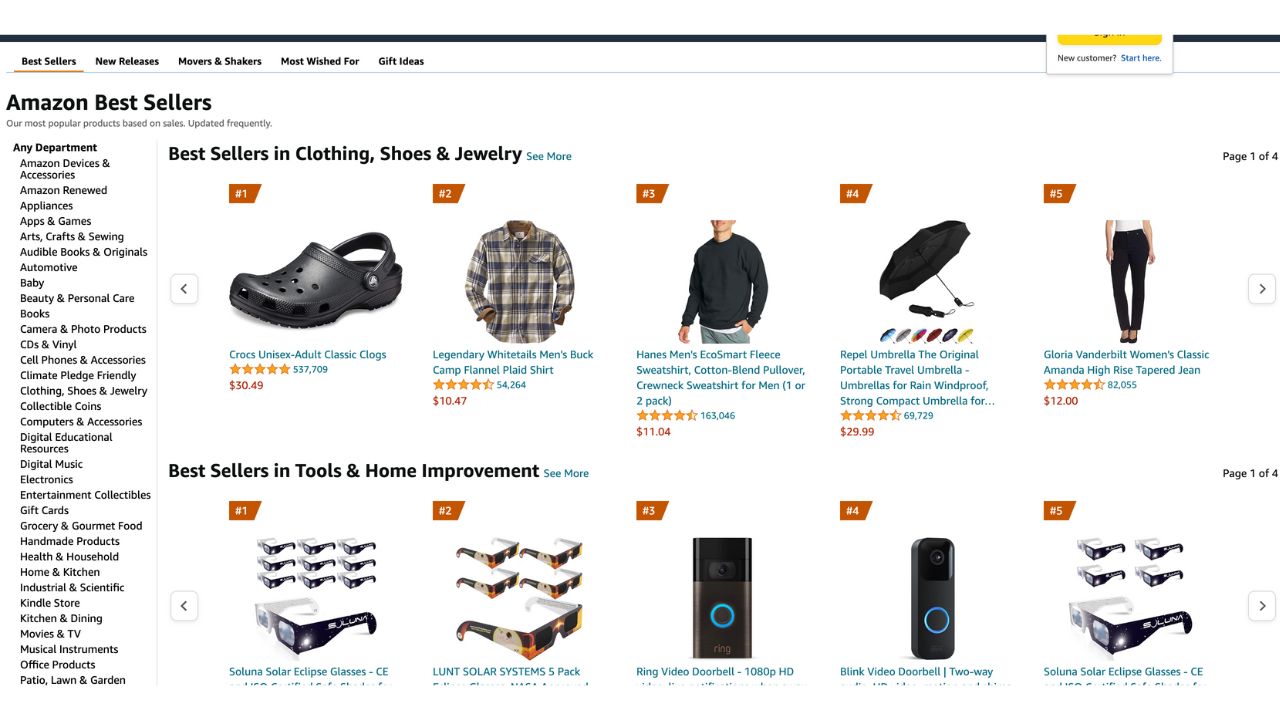You might be tempted to buy products on Amazon that have glowing reviews and high ratings. After all, who doesn’t want to get the best deal possible? Before you click that “buy now” button, you might want to take a closer look at those reviews. Because, as it turns out, not all of them are genuine.
In fact, some of them are downright fake and misleading. So, how can you tell the difference? And who is behind this shady practice? That’s what Which?, a UK-based consumer watchdog, wanted to find out. And what they discovered is shocking.
The not-so-star-studded findings
The investigation dives into a concerning trend where some Amazon sellers are veering off the ethical track. They’re nudging buyers towards leaving a five-star review in exchange for a bit of a carrot at the end of the stick.
The findings are quite the eye-opener: one in 10 Amazon customers have been offered incentives like gift cards, refunds, and even free products, all in a bid to rack up those golden stars next to their products.
MORE: HOW CLICKING ON THAT FAKE AMAZON AD CAN LEAD TO MICROSOFT SUPPORT SCAM
The ripple effect of a five-star bribe
On the surface, it might seem like a win-win. The seller gets a stellar review, and the buyer gets a little extra. But the domino effect of this practice runs deep. When the star ratings get skewed, it’s the next shopper who might be swayed into buying a not-so-great product.
How sellers manipulate reviews with cash, gift cards, and refunds
It’s a varied assortment of incentives. Some buyers found cards in their packages offering cash refunds for a positive review. Others were enticed with gift cards or even a full refund plus a little extra cash. And then there’s the email follow-ups, where sellers reach out to buyers offering a reward for changing a negative review to a positive one. It’s a spectrum of offers all aimed at one thing: painting a rosy picture with five-star reviews.
MORE: 5 SECRETS TO SHOPPING SMARTER ON AMAZON
Some sneaky Amazon sellers merge positive reviews of unrelated products to boost product ratings
The craftiness doesn’t end there. Some sellers are playing a longer game, merging positive reviews of unrelated products to boost their own product’s star ratings. It’s a murky practice that leaves the average buyer in the dark, often swayed by a high star rating; that’s not all it seems to be.
MORE: HOW TO PROTECT YOURSELF FROM SOCIAL MEDIA SCAMMERS
Shaking the foundations of trust
The findings from this investigation send a clear message that there’s a hiccup in the trust we place in online reviews, nudging online platforms and policymakers to take a closer peek.
Earlier this summer, the Federal Trade Commission (FTC) proposed new rules against similar fake online reviews. Violators would be fined $50,000 per case, and consumers hurt by fake reviews would be entitled to receive money from sellers guilty of such actions. We should know shortly by the end of 2023 if and when the proposed new rules for online reviews are adopted by the FTC and become enforceable.
It makes you wonder, if stars can be bought so easily on Amazon, what’s stopping that from trickling down to other platforms? It’s a ripple effect that could shake the trust we have in those stars and comments guiding our decisions.
MORE: HOW TO RECOGNIZE RAMPANT FAKE TECH IN ONLINE MARKETPLACES
Amazon’s response to fake and misleading reviews
In response to the ever-growing menace of fake and misleading reviews, the company established Amazon Vine for customers to get genuine and unbiased product reviews.
Amazon Vine is an invitation-only program that selects the most insightful reviewers in the Amazon store to serve as Vine Voices. These reviewers can order items free of charge and share their product experiences with Amazon customers. The goal? To help shoppers make informed buying decisions.
Once someone is accepted to be a part of the Vine Voices program, they get to choose products from a wide range of brands. These products are delivered right to their doorstep at no cost to them. After trying out these products, Vine Voices reviewers share their candid and unbiased reviews—whether they’re positive, neutral, or even negative.
These reviews appear alongside other customer reviews, and they’re distinguished with a special badge: “Vine Customer Review of Free Product.” Additionally, anyone who is a member of the Vine Program will have a badge on all the reviews they leave on Amazon, distinguishing them as Vine Voice. This badge appears next to their profile name for all reviews, whether they are related to Vine products or not.
Amazon keeps an eye on its Vine Voices reviewers, and they will evaluate the quality of their reviews over a 6-month period. If the reviews are top-notch, they stay in the program; otherwise, they might get the boot.
How to report fake reviews on Amazon
Be wary of incentives or rewards offered by sellers for leaving positive reviews. This is against Amazon’s policy and may indicate that the product is not as good as it claims to be. If you encounter such offers, you can report them to Amazon and help prevent other customers from being misled by following these steps:
- Log onto Amazon.com and sign in to your account
- Find the product page of the item that you received the offer for
- Scroll down to the customer reviews section and look for the review that matches the offer
- Click on the Report Abuse button below the review and follow the instructions
- You can also send an email to [email protected] with the details of the offer and the seller
Kurt’s key takeaways
The investigation by the UK-based consumer watchdog, Which?, uncovers a shady side to those glowing star ratings on Amazon. Shockingly, one in 10 Amazon customers has been offered bribes, from gift cards to free products, in exchange for a five-star review.
This not-so-star-studded revelation reveals how sellers manipulate ratings, potentially leading unsuspecting shoppers down a questionable path. The next time you’re tempted by a five-star product, it might be worth peeling back the layers to see the truth behind those seemingly golden ratings.
When browsing online, do you give a second thought to the reviews or dive right in? Have you ever snagged a deal based on raving reviews only to scratch your head later? Share your take and any review misadventures in the comments below.
FOR MORE OF MY TECH TIPS & SECURITY ALERTS, SUBSCRIBE TO MY FREE CYBERGUY REPORT NEWSLETTER HERE
Answers to the most asked CyberGuy questions:
- What is the best way to protect your Mac, Windows, iPhone, and Android devices from getting hacked?
- What is the best way to stay private, secure, and anonymous while browsing the web?
- How can I get rid of robocalls with apps and data removal services?







7 comments
So very true. I gave a poor review for a toy I bought for my great granddaughter. The company notified me that if I would take down the review, they would give me the toy for free. I now only look at the bad reviews as they are the only ones I trust.
Keep in mind that anyone who participates in the Vine program must pay taxes on the value of whatever they order. So Vine is far from being “free of charge.”
Last week I received one of these scam emails. The person said to keep her job, she needed me to leave a 5 star review on Amazon. If I didn’t do this, she would lose her job and get no reference. I ignored it. Several days later, “Marlene” sent me another email. Again she lamented her potential job loss over my review then offered me a $20 Amazon gift card. Yeah, right. Not biting, Marlene! I tried to call Amazon. Now I will go back and follow Kurt’s directions to report this.
Just sent a comment about this problem of bribing Amazon customers to receive a better review. Kurt, is this an identity theft issue? A hacking of personal information through Amazon? I did receive one of these ‘bribes’ about an item ordered back in July, the email was a week ago (early October). I had returned the item, gave it a 1 star bc it simply didn’t work. So today, I followed your directions to give Amazon a heads up. This item is no longer available on Amazon. It had my 1 star review & a 5 star given several days after my review. . .suspicious. If the email I received wasn’t from the company, HOW did they get my info? I have blocked their email address.
Hi Diana. It’s possible that the email was sent by a third-party seller who obtained your email address through Amazon’s platform. However, it’s also possible that the email was part of a phishing scam designed to trick you into revealing your personal information. Be cautious when receiving unsolicited emails and verify the authenticity of the sender before responding or clicking on any links. If you suspect that an email is part of a phishing scam, do not respond or click on any links and report it to Amazon immediately.
I bought a product and later received a postcard from the seller offering gift cards. Chat with Amazon about this to see if true, they said probably spam. Told Amazon they had total sales order info and it had to be Amazon or seller. Still said spam. I did review, sent seller a picture and they sent digital gift cards. Chat with seller about problem getting Amazon to recognize this was not spam and they sent more digital gift cards. YES IT DOES HAPPEN!
I have had AMZN not post comments which made me believe they are tainted. I bought a rotary hammer from a foreign company. They then offered me a free set of screwdrivers if I gave them a five star review and sent them a screenshot.
Turns out their product deserved a five star rating! The set of screw drivers also were five star.